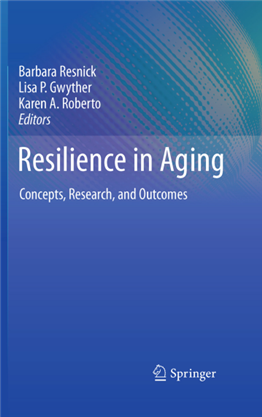- 글번호
- 28190296
- 일 자
- 19.12.23
- 조회수
- 269
- 글쓴이
- 연령통합고령사회연구소
- [정책보고서] Resilience in aging concepts, research, and outcomes
-

14. Resilience in aging concepts, research, and outcomes
- 발행년도: 2011년
- 발행처: University of Maryland School of Nursing, Center for the Study of Aging and Human, Center for Gerontology, Virginia Polytechnic Institute and State University
- 주요내용: This book provides a comprehensive look at the many aspects of resilience and the ways in which older adults can build resilience and overcome challenges experienced throughout the aging process. The chapter authors provide several different definitions of resilience. For example, Allen et al. (Chap. 1) describes resilience as a dynamic process of maintaining positive adaptation and effective coping strategies in the face of adversity, or simply stated resilience is a dynamic process of adaptation to adversity. Hochholter et al. (Chap. 2) refer to resilience as an extraordinary and positive response to a challenge or stressor, and Rosowsky in Chap. 3 notes that resilient older adults are able to tolerate the vicissitudes of aging and defray the overhead of growing old. Across the many definitions and descriptions of resilience provided, resilience is conceptualized to reflect an effective response to some type of adversity or challenge, whether it is physical, psychological, economic,
political, environmental, or social.
- Link: https://www.researchgate.net/publication/272851557_Resilience_in_Aging_Concepts_Research_and_Outcomes
<Table of Contents>
- Resilience: Definitions, Ambiguities, and Applications
- Successful Aging and Resilience: Applications for Public Health and Health Care
- Resilience and Personality Disorders in Older Age
- What Do We Know About Resilience in Older Adults? An Exploration of Some Facts, Factors, and Facets
- Psychological Resilience
- Physiological Resilience
- Using the Arts to Promote Resiliency Among Persons with Dementia and Their Caregivers
- Promoting Worker Resilience Over the Lifecourse
- Resilience in Aging: Cultural and Ethnic Perspectives
- Civic Engagement: Policies and Programs to Support a resilient aging society
- Strengthened by the Spirit: Religion, Spirituality and Resilience Through Adulthood and Aging
- Resilience in Chronic Illness
- The Relationship Between Resilience and Motivation
- The Association Between Resilience and Survival Among Chinese Elderly
- Fostering Resilience in Dementia Through Narratives: Contributions of Multimedia Technologies
- Building Resilience in Mild Cognitive Impairment and Early-Stage Dementia: Innovative Approaches to Intervention and Outcome Evaluation
- African American Caregivers Finding Resilience Through Faith
- An Environmental Intervention to Increase Aging Resilience
- Promoting Resilience in Small-Scale, Homelike Residential Care Settings for Older People with Dementia: Experiences from the Netherlands and the United States
- A Geriatric Mobile Crisis Response Team: A Resilience-Promoting Program to Meet the Mental Health Needs of Community-Residing Older People
- Optimizing Resilience in the 21st Century
- Resilience in the Workplace: Job Conditions that Buffer Negative Attitudes Toward Older Workers
- Conclusion
